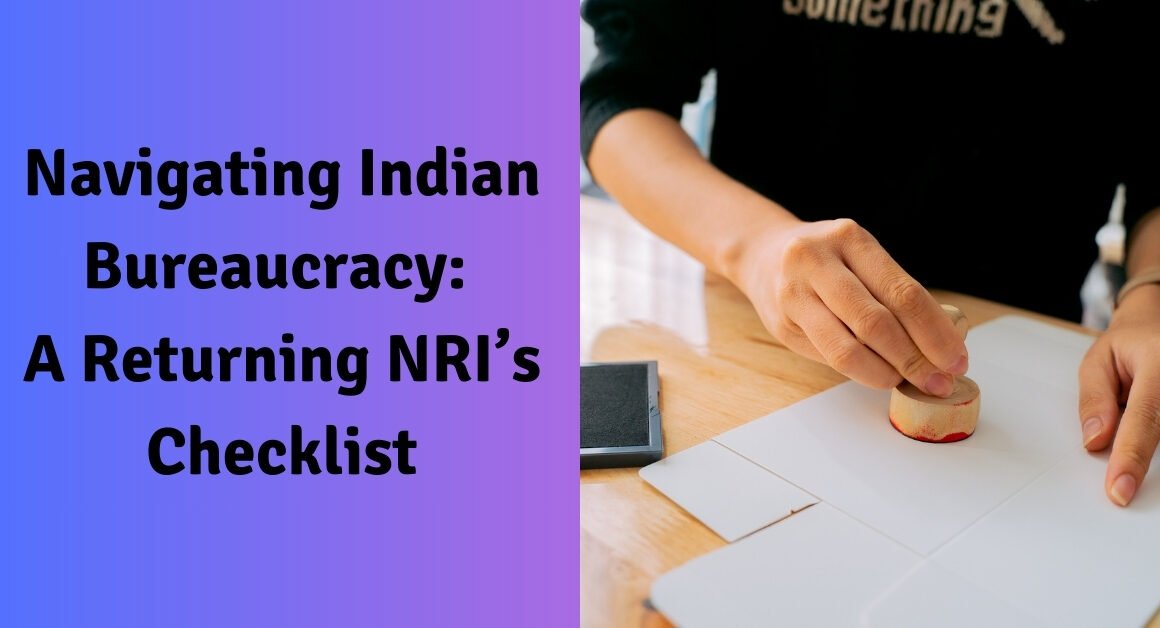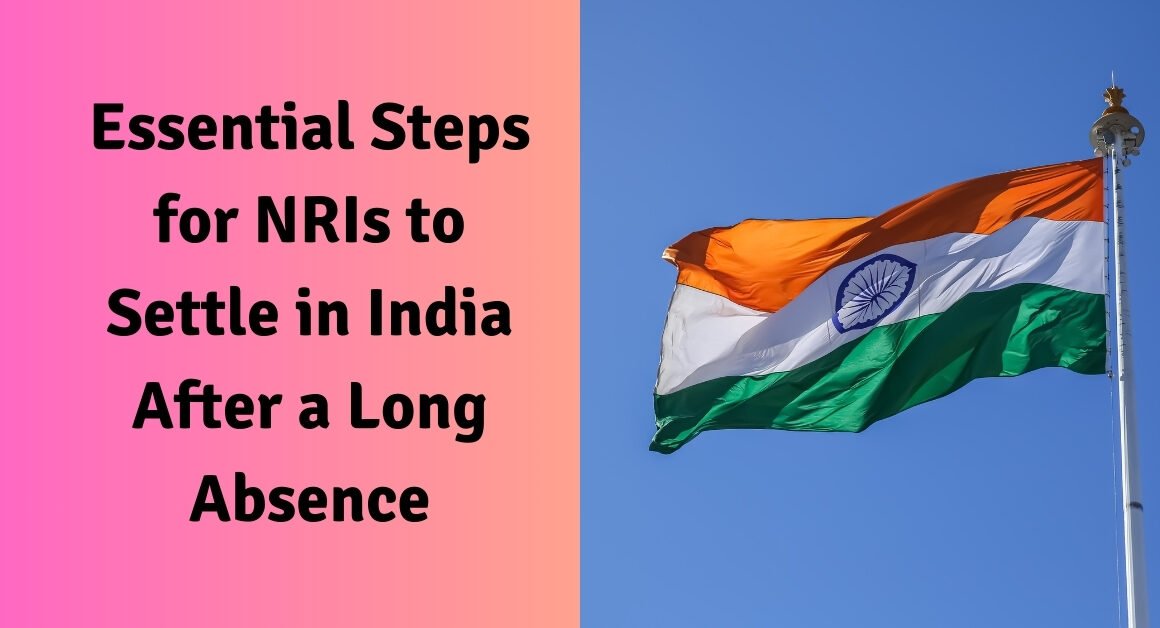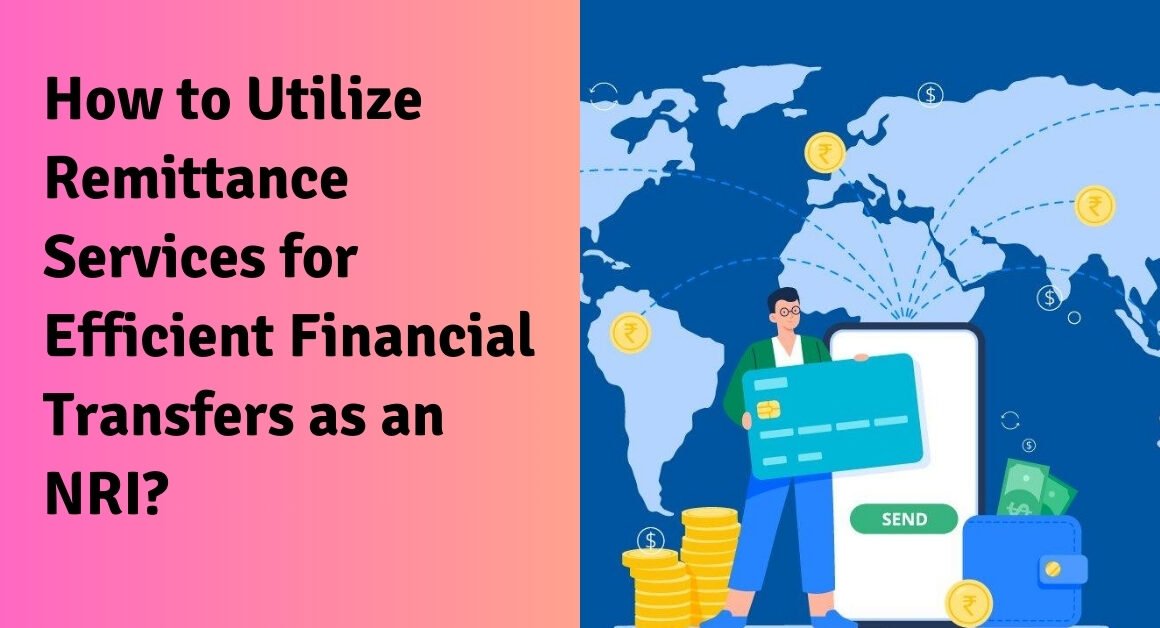How to Build an NRI Investment Portfolio for Indian Markets?
Building an investment portfolio for a Non-Resident Indian (NRI) is an artful blend of global financial expertise and market understanding of India. With numerous options at hand in the form of equities and mutual funds, real estate, and fixed deposits, Indian markets hold bright prospects for NRIs. But it is the awareness of the local laws and choice of investment avenues that counts for maximizing returns. In this blog, let us find out how NRIs can build a diversified, profitable portfolio in the Indian market. Understand NRI Investment Regulations To begin with, you need to know the laws that regulate NRI investments. Some of the areas you need to consider are: NRE, NRO, and FCNR Accounts: NRIs require special accounts for investments. Repatriable income is conducted through NRE accounts, while NRO accounts are involved with income earned in India. FCNR accounts allow you to maintain foreign currency money. FEMA Regulations: Foreign Exchange Management Act (FEMA) governs all NRI investment. Ensure that you comply with FEMA when remitting foreign funds to India to be invested. Tax Rules: NRIs do have some tax rules, like the taxation of capital gains on mutual funds, property, and equity investments. Understanding the tax implications is important for effective portfolio management. Following these rules makes your investments legitimate and your returns optimized. By investing in these, you can reduce your tax outgo and increase overall portfolio returns. Conclusion Formulating an NRI investment portfolio for the Indian markets needs planning, diversification, and familiarity with the regulatory setup. By investing in asset classes like equities, real estate, and debt securities, you can build a diversified portfolio that gives you both growth and stability. Using tax-efficient investments and familiarity with repatriation rules will help you to optimize returns. Lastly, hedging risks by strategic diversification and expert advice can ensure long-term success in the Indian market. FAQs Disclaimer: The information provided here is for educational and informational purposes only and should not be construed as financial, legal, or tax advice. Consult with a qualified professional before making any investment decisions. We do not accept any liability for errors or omissions in this information nor any direct, indirect, or consequential losses arising from its use.
How to Maximize Your Investments and Savings After You Return to India?
Coming back to India after living overseas as an NRI gives you a one-time chance to re-evaluate your financial strategies and goals. This is the ideal time to maximize your investments and savings in order to build long-term financial security. The Indian economy is full of opportunities, but the environment may not be the same as the overseas markets you are used to. This blog will take you through five important areas in which you can maximize your savings and investments on coming back to India. Review Your Savings Plan: INR vs Foreign Exchange One of the initial steps on coming back to India is to consider where you’d like to keep your savings. Do you keep your savings in Indian Rupees (INR) or hold some in foreign exchange? Both have pros. Diversify Your Investment Portfolio One of the wisest things to do after coming back to India is to diversify your investments in various asset classes. Although you might have invested in foreign markets earlier, India has a lot of profitable opportunities too. Utilize Tax-Saving Investments When you return to India, you become a resident for tax purposes, hence your income becomes liable for taxation under Indian taxation laws. Nevertheless, there are several tax-saving instruments that will enable you to decrease your taxable earnings while increasing wealth. Create Emergency Funds It is important to have an emergency fund for financial stability, particularly after returning to India. The purpose of an emergency fund is to meet unforeseen expenses such as medical emergencies, unexpected loss of a job, or immediate repairs at home. Plan for Your Retirement Retirement planning after coming back to India is a long-term plan that needs to be thought through. The cost of living, inflation, and medical expenses must be considered while planning for retirement. Conclusion Maximizing your investments and savings upon your return to India involves a combination of prudent planning, diversification, and utilization of tax-saving tools. By analyzing your savings plan, diversifying your investments, creating emergency funds, and retirement planning, you can establish a strong financial base for yourself and your family. The Indian financial environment provides ample scope for growth, and by making the right decisions, you can ensure your financial future. FAQs Disclaimer: The information provided here is for educational and informational purposes only and should not be construed as financial, legal, or tax advice. Consult with a qualified professional before making any investment decisions. We do not accept any liability for errors or omissions in this information nor any direct, indirect, or consequential losses arising from its use.
The Cost of Living in Different Cities for Repatriating NRIs
One of the most essential things that you should consider while planning to repatriate to India is the cost of living in different cities. Due to India’s incredible diversity, the cost of living is extremely dependent on where you are planning to settle down. The price of everything from accommodation to health care to travel and lifestyle overall can be a function of the cost of living you can afford or are prepared to attain. In this manual, we’re going to consider the cost of living in five of India’s largest cities so that you can make an informed choice for your return. Mumbai: The Financial Capital Mumbai is the financial hub of India and is famous for its hectic lifestyle, but with an extremely high cost of living. Delhi: The Political Capital Delhi, as the capital city of India, offers a lower cost of living when compared to Mumbai, with a more diversified housing sector and less expensive lifestyle choices. Bangalore: The IT Hub Bangalore is a favorite among repeat NRIs, especially those working in the IT industry. The city offers a combination of modern amenities and a relatively moderate cost of living. Chennai: The Cultural Hub Chennai is unique with rich culture, good medical centers, and relatively inexpensive living, especially for returning NRIs. Hyderabad: The Emerging Tech City Hyderabad has developed into a commercial and technology hub with a reduced cost of living compared to other metropolis cities. Conclusion Choosing the right city to reside in after your return to India is also crucial in managing your retirement and financial planning. Mumbai and Delhi offer high-end living but come at a high cost, while Bangalore, Chennai, and Hyderabad offer low-end living with high quality of life. Pitting housing, health care, and lifestyle costs against each other will help you choose the best fit for yourself. FAQs Disclaimer: The information provided here is for educational and informational purposes only and should not be construed as financial, legal, or tax advice. Consult with a qualified professional before making any investment decisions. We do not accept any liability for errors or omissions in this information nor any direct, indirect, or consequential losses arising from its use.
How to Plan Your NRI Retirement in India?
Indian retirement once more for NRIs (Non-Resident Indians) is a thrilling and crucial step. With too many tax-saving, investment, and financial product options to look into, preparing for a cozy retirement needs utmost care. The following article suggests five crucial steps for NRIs to create a secure and stress-free retirement strategy in India. Choose the Correct NRI Account The initial step in retirement planning is to choose the right NRI account to manage your money. There are three significant options: Invest in Retirement Schemes There are many retirement schemes available for NRIs in India that ensure financial security for the later part of life. Prominent alternatives are: Develop a Diversified Investment Portfolio Government-sponsored schemes are necessary, but diversifying investments is necessary to prevent market volatility and receive maximum returns. Keep the following in mind: Tax Planning for NRIs Tax management and taxes are an integral part of retirement planning. NRIs are taxed Indian tax on Indian income like rent, dividend, and capital gains. Avail the advantage of tax-saving options like Section 80C in order to reduce your tax liability. Also, look at the Double Taxation Avoidance Agreement (DTAA) under which you cannot be taxed both in India and your native country. It is advisable to consult a tax advisor to go through the intricacies of taxation and maximize your retirement funds. Get Health Insurance Health is one of the greatest worries during retirement. India boasts a huge number of health insurance companies offering complete cover. NRIs returning to India must buy a good hospitalization, critical illness, and other medical expenditure-covering health insurance policy. International health insurance policies providing cover in India as well as overseas are undertaken by some NRIs, providing flexibility. Conclusion Opening a retirement plan in India as an NRI requires careful planning of your finances and acquaintance with the best available options for you. By choosing the proper bank accounts, investment in safe plans, diversifying your portfolio, tax planning, and organizing healthcare cover, you can build a good and sustainable retirement plan. Plan wisely, take a consultant’s advice, and enjoy a tension-free and comfortable retirement in India. FAQs Disclaimer: The information provided here is for educational and informational purposes only and should not be construed as financial, legal, or tax advice. Consult with a qualified professional before making any investment decisions. We do not accept any liability for errors or omissions in this information nor any direct, indirect, or consequential losses arising from its use.
Tips for Building a Strong Financial Foundation After Returning to India
Returning to India after living overseas can be an exciting but challenging period, especially managing your finances. Even though you have likely built some financial ground where you’ve stayed, it’s essential to begin with a stable foundation in India. This guide will walk you through practical tips to set a stable financial footing once you return home. Conclusion Reorienting your life back in India financially after gaining overseas experience is scary, but proper planning and a clear strategy will help you settle well financially. The secret is to set smart goals, manage your savings and investments with prudence, have knowledge about taxes, and enjoy proper insurance cover. These actions will make sure that you do well financially in your second life. FAQs Disclaimer: The information provided here is for educational and informational purposes only and should not be construed as financial, legal, or tax advice. Consult with a qualified professional before making any investment decisions. We do not accept any liability for errors or omissions in this information nor any direct, indirect, or consequential losses arising from its use.
Navigating Indian Bureaucracy: A Returning NRI’s Checklist
Returning to India as an NRI after years in foreign soil is thrilling yet daunting. A hassle-free return process requires you to navigate through the complexities of Indian bureaucracy. This checklist helps guide and streamline the most important steps that make your return hassle-free. 1. Update Your Indian Address Proof All important documents will have the new address on the cards, such as Aadhaar and Voter ID so that there is no delay in the utility services or the new bank accounts issued. Most recently, governments have decided and demanded to add the Aadhaar connection to every utility service account so that no one would work the bank account facilities or would use all of the services individually without permanent connections (Times of India 2024). 2. Opening an NRI Savings Bank Account You would have been maintaining NRE and NRO accounts as an NRI. At the time of return, these have to be converted into a savings bank account for residents. Resident accounts are non-taxable and NRE accounts are tax-free. Such an extremely important process so that you do not attract tax on the soil. Contact your banker for conversion. 3. Tax Compliance: Convert to file as a Resident Once you come back to India, your tax status changes. A resident will pay tax in India on world income. The Indian government has tightened compliance; hence the NRIs returning have to declare overseas income as well (Source: Economic Times, 2024). An experienced tax consultant can guide you in the new tax obligations. 4. Property Documents All documents, such as registration and taxes, should be updated if you own or are planning to buy a property in India. You may also want to hire a property lawyer for NRIs who deal with ancestral properties or pending registrations to avoid delay. 5. Update PAN and Aadhaar Financial transactions would need both PAN and Aadhaar. Make sure that your PAN card reflects the resident status and is linked with your Aadhaar because Aadhaar was also made mandatory by the government for the PAN card, “Now, linking PAN with Aadhaar is necessary while obtaining a new PAN card or PAN card updation,” says Lavai (Business Standard, 2024). 6. Reactivation of Driving License If you want to drive in India, renew your license or make sure that it is renewed if it already expired. While the process is different in every state, in general, all you need is your old license, proof of residence, and a medical examination. 7. Health Insurance Indian health policies are different from international insurance policies. Ensure sufficient cover coverage, especially for retirees and sick people. In recent times, most of these insurers also allow comprehensive returns to be possible for NRIs. 8. Review Investment Strategy Once you are back, then you get a chance to enjoy investment facilities through PPF and direct investment in the stock market. If you consult a financial consultant, you’ll be able to have your domestic and international portfolios well-balanced and in conformation with the norms of India. 9. Report Financial Institutions Inform your respective banks, insurance providers, and mutual fund houses about your return to India. Some accounts and investments are NRIs-only accounts, and the failure to update your status can lead to potential problems in their management of finances. Conclusion: Be prepared for a seamless transition. That, of course, is if all your documentation is in order and you convert your accounts and, most importantly, meet the tax and legal requirements of the country you are returning to. Under professional advice, it becomes a lot easier to negotiate the complexities to make it a successful and stress-free exercise. FAQs’ Disclaimer: The information provided here is for educational and informational purposes only and should not be construed as financial, legal, or tax advice. Consult with a qualified professional before making any investment decisions. We do not accept any liability for errors or omissions in this information nor any direct, indirect, or consequential losses arising from its use.
Understanding Indian Social Security and Pension Schemes for NRIs
Cracking the code of Indian social security and pension schemes can be a daunting task if you’re an NRI. Don’t worry; this guide will break it down in a fun and straightforward manner so that you can get back to securing your financial future while planning your return to India or maintaining ties here. Let’s see what’s on offer and how NRIs can benefit from these schemes. Social Security Schemes: Do NRIs Even Qualify? Good news—yes, NRIs can benefit from some Indian social security schemes, although there are variations regarding eligibility and the benefits. Such schemes are usually aimed at giving financial security during old age and retirement. So, here are two main schemes you should be aware of: In a fun twist, NPS has flexible investment options—so whether you’re conservative or a risk-taker, there’s something for you. Even better? NPS is eligible for tax benefits under Section 80C of the Income Tax Act! Pension Schemes for NRIs: Your Retirement Plan Sorted While many pension schemes are available, let’s focus on those that are most relevant and beneficial for NRIs. Things to Know How NRIs Can Enroll in These Schemes NRIs can easily enroll in NPS or other schemes through an NRO or NRE account in India. For EPF, if you previously contributed while working in India, check your eligibility for withdrawal through the online EPFO portal. Similarly, schemes like PMVVY and APY can be availed via your Indian bank account, and the application processes are fairly simple. Understanding Double Taxation: Is It Tax-Free? Taxation is one of the major concerns for NRIs investing in Indian social security and pension schemes. India has Double Taxation Avoidance Agreements (DTAA) with many countries, so you are not taxed twice on the same income. For example, the pension income received in India might be taxed here, but the DTAA may prevent further tax in your country of residence. Conclusion Secure Your Future, Stress-Free- Whether you retire in India or continue to keep some financial relationship with your country of origin, understanding social security and pension schemes is important. From the flexible NPS to the assured returns from PMVVY, there are various ways of securing your financial future. So, with the right planning, you can avail all these benefits even from outside India. So, take charge and let India’s social security programs work for you! FAQs 1. Can NRIs contribute to NPS? Ans – Yes, NRIs can contribute to NPS and benefit from tax deductions. 2. Are pensions from Indian schemes taxable? Ans – Yes, but India’s DTAA with other countries can prevent double taxation. 3. Can NRIs withdraw their EPF funds? Ans – Yes, if you contributed while working in India, you can withdraw EPF. 4. Is the PMVVY scheme available to NRIs? Ans – Yes, NRIs above 60 can invest in PMVVY. 5. Is the Atal Pension Yojana suitable for NRIs? Ans – Yes, if they have a bank account in India. 6. Do NRIs get tax benefits on NPS contributions? Ans – Yes, under Section 80C, up to ₹1.5 lakh annually. 7. Can NRIs receive pensions while living abroad? Ans – Yes, you can receive pensions in your NRO account. 8. Is it easy for NRIs to open an NPS account? Ans – Yes, NRIs can open an NPS account through an NRO or NRE account. 9. Does India have pension schemes for senior NRIs? Ans – Yes, PMVVY is ideal for NRIs above 60 years old. 10. Can NRIs invest in Indian social security schemes online? Ans – Yes, NRIs can enroll in schemes like NPS through online portals. Disclaimer: The information provided here is for educational and informational purposes only and should not be construed as financial, legal, or tax advice. Consult with a qualified professional before making any investment decisions. We do not accept any liability for errors or omissions in this information nor any direct, indirect, or consequential losses arising from its use.
How to Rebuild Your Career in India as a Returning NRI?
Coming back to India after years abroad is like a time machine—a familiar yet entirely different scene. One of the biggest challenges for NRIs coming back home is rebuilding their career in a country that may have changed significantly during their time abroad. But do not worry! Be a technical wizard, finance wizard, or any other creative wizard; there’s definitely room for you in India’s rising economy. So, let’s get started and see how one can rebuild a career in India successfully with a splash of fun and some useful facts. 1. Evaluate the present job market: Where’s the gold? Understand the trend of the industry First and foremost, one needs to understand the job market in India. If you have been working in high-demand sectors like IT, finance, or healthcare, then you are a lucky person! These sectors are on fire. NASSCOM states that India’s IT industry will touch $245 billion by 2025, which is a lucrative sector for returning NRIs. But if you have been working in niche markets abroad, you might need to adapt or upskill. Local or Global Companies? Fun fact: Some of the companies you worked for abroad might have offices right here in India! Global firms like Amazon, Microsoft, and Deloitte are constantly expanding their operations in India. If you’re used to working in a multinational environment, you might want to check out these companies for a smooth transition. 2. Leverage Your International Experience: Play the Trump Card Highlighting Your Unique Skill Set: Being an NRI gives you a unique edge. You have global exposure, cross-cultural experience, and possibly worked in diverse environments. Don’t shy away from flaunting these qualities. Employers in India are increasingly looking for professionals with international experience who can bring fresh perspectives to the table. Networking Is Your Superpower: Little secret here: sometimes your network is worth way more than your resume. Probably, after returning from abroad, you will feel rather disconnected from your Indian professional circles. Here comes LinkedIn, professional groups, and industry events. Attend any of the mentioned above. Reach out to former colleagues. Connect with recruiters who place NRIs 3. Upskilling: Bridging the Gap Between Global and Local Closing the Skills Gap: India’s job landscape has changed over time, and to remain afloat, upskilling in the right areas becomes necessary. You should look at taking courses on websites such as Coursera, Udemy, or edX to acquire updated certifications in an area of specialty. For an IT professional, cloud computing or AI skills could be the one. In India, 68% of recruiters prefer candidates holding certifications in emergent technologies; hence, try to get on the bandwagon! Adapt to Indian Work Culture: Although you may have lived here in the past, the work culture in India could be unfamiliar now after having been abroad for several years. The work culture in India is known for being fast-paced, hierarchical, and relationship-based. Knowledge of these nuances would help you manage the workplace very effectively. 4. Be an Entrepreneur: Become Your Own Boss Why Not Start Something of Your Own? If you’ve always dreamed of being your own boss, perhaps now’s the time. India is on the boil with all the opportunities of startup culture. And as a returning NRI, you get an additional edge of understanding both international and domestic markets. Do you know? India has more than 100 unicorns (companies whose value has crossed $1 billion), and it positions India as one of the major startup hubs in the world. Whether you are launching an app, a consulting firm, or a bakery may be the time to take the plunge! Government Support for Startups: The Indian government has been encouraging entrepreneurship with schemes such as Startup India. Tax benefits, easier compliance, and access to funding have made it easier to bring a business idea to life. So, if you have an idea for a business, now is the time to do it. 5. Relocate to the Right City: Find Your Career Hub Choosing the Best City for Your Career: Not all cities in India are the same when it comes to job opportunities. Bangalore is often called the “Silicon Valley of India” and is the go-to place for techies. Mumbai is the financial capital, offering plenty of opportunities in banking, finance, and media. Delhi-NCR is a great hub for professionals in consulting, marketing, and sales. Choose a city that aligns with your career goals and industry. Work-Life Balance Matters: Many NRIs returning to India prioritize work-life balance. Luckily, cities like Pune and Hyderabad offer a blend of career opportunities and a relatively lower cost of living compared to the big metros. Conclusion Embrace the New Journey- Rebuilding your career in India as a returning NRI is exciting and challenging. With the right strategies—like leveraging your international experience, staying updated with industry trends, and building a strong network—you can not only reintegrate into the Indian job market but thrive in it. So, gear up for this new adventure, because the opportunities are endless, and the best is yet to come! FAQs 1. Is it hard for NRIs to find jobs in India? Ans – No, many industries value NRIs for their global experience. 2. Do I need certifications before job hunting in India? Ans – Not mandatory, but they help in staying competitive. 3. Can I work for global companies from India? Ans – Yes, many global companies have operations in India. 4. How can I showcase my international experience? Ans – Highlight cross-cultural skills and global exposure. 5. Is starting a business in India a good option for NRIs? Ans – Yes, India’s startup scene is thriving with opportunities. 6. How can I network after returning? Ans – Use LinkedIn, attend industry events, and reconnect with peers. 7. Which Indian cities are best for NRI jobs? Ans – Bangalore, Mumbai, Delhi-NCR, Hyderabad, and Pune. 8. Are there government schemes for NRI entrepreneurs? Ans – Yes, Startup India offers benefits for NRIs. 9. What are my tax obligations when returning
Essential Steps for NRIs to Settle in India After a Long Absence
Spending years living abroad is sure to make returning to India a whole new adventure for NRIs. On the one hand, the nostalgia of moving to your homeland is exciting; on the other hand, settling down in India can be a little difficult. So here’s a handy guide full of important steps that NRIs need to take to settle down in India after a long time abroad, doused with some fun facts and a touch of humor. 1. Rethink Your Savings: From NRI to Resident NRO vs NRE Accounts: During the time spent abroad, NRIs usually continue having NRO (Non-Resident Ordinary) and NRE (Non-Resident External) accounts. However, when you finally settle in India, it is time to re-evaluate and even merge these accounts for a better approach towards your finances. An easy way to remember this transition is that “NRO means No Resident Obligations”- almost. Conversion of NRI Bank Accounts: According to RBI regulations, you’ll need to convert your NRE and NRO accounts into resident savings accounts when your status changes from NRI to a resident Indian. It sounds complex, but most banks have a smooth process for this. Fun fact: By March 2023, NRIs held about $130 billion in deposits in Indian banks, which makes it quite a club to belong to! 2. Manage Your Investments: Update Residential Status Investment Portfolio Adjustment: Your offshore investment strategy might have included offshore accounts, foreign stocks, or properties. It is now time to review these once you have entered India. Recontact your financial advisor- here Prime Wealth can help you for a smooth process of financial planning to return back to India and update your residential status in your mutual fund investments. Don’t forget to check the tax department’s guidelines on this, as rules may vary with foreign assets. (Of course, taxes want to tag along with you!) Residential Status Update in Mutual Funds: NRIs are required to update their KYC details with financial institutions, especially mutual fund investments. Not to worry—it’s not rocket science! Just provide proof of your new address and residential status. 3. Tax Obligations: Return of the Resident Taxpayer Filing Income Tax in India: You will have to pay taxes in India again if you return as an NRI. Yay! (Or not?) The Indian tax system is quite intimidating, but it’s not all bad news. If you have spent more than 182 days abroad in the previous financial year, you might still be considered an NRI for that year and get some tax exemptions. Double Taxation Agreement (DTAA): Worried about getting taxed twice? Good news! India has DTAA agreements with several countries, which means you won’t pay double taxes on income earned abroad. In 2024, 96 countries had signed DTAAs with India, so chances are you’re covered. 4. Update Your Legal Documents: Keep the Paperwork in Check PAN Card and Aadhaar Linkage: As an NRI returning to India, ensuring your PAN card is linked to your Aadhaar is crucial. From filing taxes to opening a new bank account, you’ll need these documents to be in sync. Without them, it’s like trying to make chai without tea leaves—not going to work! Review Property and Will Documents: If you own property in India or abroad, update the legal paperwork, including your will. Ensure that your property ownership and succession plans are in accordance with Indian laws. You wouldn’t want any unwanted surprises later—no one likes a cliffhanger ending. 5. Healthcare: Stay Covered Health Insurance for Returning NRIs: Health is wealth, and you’ll want to ensure you have the right coverage when you return. Many NRIs find that their international health insurance policies aren’t valid in India, so getting a local policy is a must. Did you know? In 2023, India ranked among the top 20 nations for affordable healthcare, with many NRIs opting for treatments in their home country. Check Your Vaccinations: This sounds a bit weird, but depending on the place one has been living, some vaccinations may be required upon going back to India. Double-check this with your healthcare provider and stay up to date with routine vaccinations. 6. Reintegrating into the Indian Lifestyle Finding the Right City: Coming back after years away can be disorienting, especially if you’ve been living in a small European town. India is a bustling and vibrant country, and each city offers something unique. Whether it’s the technology hubs of Bangalore or the cultural tapestry of Jaipur, choose a city that fits your needs and preferences. Getting Used to the Noise Again: From constant honking to colorful street markets, India is known for its organized chaos. But we bet after a few days, it will feel like home again. After all, what is India without some delightful drama? Conclusion: Get Used to Change Settling back into India is a big change for NRIs, but with proper measures and planning, you will be able to do so in a relatively easy way. Reassess your finances, update legal documents, take care of health issues, and do not forget to absorb the unique lifestyle the country offers. In no time, you will rediscover the charm of being home. FAQs 1. Do I need to close my NRI accounts after returning to India? Ans – Yes, NRIs must convert their NRE and NRO accounts into resident savings accounts after returning permanently. 2. How do I update my KYC after returning to India? Ans – You can update your KYC by submitting proof of your new residential address and status to your financial institution. 3. Will I be taxed on income earned abroad after returning to India? Ans – Under the Double Taxation Avoidance Agreement (DTAA), you may not have to pay double taxes on foreign income. 4. What is the process of converting NRI investments after returning to India? Ans – You’ll need to inform your financial advisor about your change in status and update your residential status with your investment portfolio. 5. Can I still hold foreign bank accounts after returning to India? Ans –
How to Utilize Remittance Services for Efficient Financial Transfers as an NRI?
As an NRI (Non-Resident Indian), managing your finances across borders efficiently is crucial for maintaining your financial well-being. One of the most important aspects of cross-border financial management is understanding and utilizing remittance services effectively. This comprehensive guide will help you navigate the complexities of international money transfers and make informed decisions about your remittances. Understanding Remittance Services Remittance services are financial platforms that enable you to transfer money from your country of residence to India. These services have evolved significantly over the years, moving from traditional bank transfers to sophisticated digital platforms that offer competitive exchange rates and lower transaction fees. Types of Remittance Channels Banking Channels Traditional bank-to-bank transfers remain a popular choice among NRIs. Most major Indian banks offer specialized NRI banking services, including HDFC, SBI, ICICI, and Axis Bank. These services typically include SWIFT transfers, wire transfers, and online remittance facilities. Online Money Transfer Services Digital platforms like Wise (formerly TransferWise), Xoom, and Remit2India have revolutionized the remittance landscape. These services often provide better exchange rates and lower fees compared to traditional banks. They also offer the convenience of initiating transfers from your smartphone or computer. Exchange Houses Popular in Gulf countries, exchange houses provide quick and reliable money transfer services. They often have tie-ups with Indian banks, enabling faster processing of remittances. Factors to Consider When Choosing a Remittance Service Exchange Rates Exchange rates can significantly impact the amount your beneficiary receives. Compare rates across different service providers, keeping in mind that the best exchange rate doesn’t always mean the best deal – you need to factor in transfer fees as well. Transfer Fees Service providers charge different types of fees: Transfer Speed While some services offer instant transfers, others might take 2-5 business days. Consider whether you need immediate transfer or can wait for a more cost-effective option. Security Features Ensure the service provider is registered with regulatory authorities and offers robust security features like two-factor authentication and encryption. Best Practices for Efficient Remittances Regular vs. Lump Sum Transfers Consider whether making regular smaller transfers or occasional larger transfers works better for you. Factor in fee structures and exchange rate fluctuations while deciding. Timing Your Transfers Keep an eye on exchange rate trends and time your transfers accordingly. However, don’t get too caught up in trying to perfectly time the market. Documentation Requirements Maintain proper documentation for your transfers, including: Tax Implications and Compliance Remember that international money transfers have tax implications both in your country of residence and India. Maintain proper records of all transfers for tax filing purposes. Ensure compliance with FEMA (Foreign Exchange Management Act) regulations and other applicable laws. Frequently Asked Questions (FAQs) Disclaimer: The information provided here is for educational and informational purposes only and should not be construed as financial, legal, or tax advice. Consult with a qualified professional before making any investment decisions. We do not accept any liability for errors or omissions in this information nor any direct, indirect, or consequential losses arising from its use.











